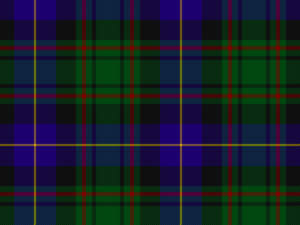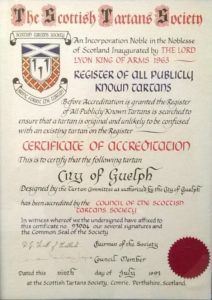On this page
Origins of the Guelph Tartan
When David Newlands suggested to Guelph City Council that a tartan be created for the City, he visualized a District Tartan; one that persons living in this community could identify with, would find pleasing and would wear with pride and satisfaction.City Council asked the newly established Tartan Committee (members included J. Archibald McIntyre, Don Peacock, Charles Hunter, C. Steward Halliday, David Newlands, and Cynthia Rantoul-Leach) to “Design a tartan which would have historical significance to the City of Guelph and which would be saleable to the public in a wide range of uses.”
The Tartan Committee’s petition for accreditation of the Guelph Tartan by the Scottish Tartans Society was submitted before the executive of the Council of the Society at a meeting held on July 9th, 1993.
Having checked the tartan against the Register of All Publicly Known Tartans and having found it to be original and unlikely to be confused with another tartan, the Society confirmed that the Committee’s petition had been successful and a Certificate of Accreditation was granted. A woven sample of the tartan was received by the Scottish Register of Tartans for permanent preservation in the National Records of Scotland.
The result – the Guelph Tartan – which can be considered harmonious and attractive, commemorates the “Royal City’s” origin, and honours one of Guelph’s famous sons, whose World War I poem is preserved in the world’s consciousness.
The design
Gold, Royal Blue, Black, Reseda Green and Crimson were the colours selected for the tartan. These colours were derived from those used in the Official Coat of Arms for the City of Guelph, which was originally adopted in 1879 with the proclamation of Guelph becoming a City.

Colonel John McCrae, M.D. the composer of “In Flanders Fields”, made an enduring contribution which is commemorated in the McCrae House in Guelph. The Tartan Committee drew inspiration from the MacRae Hunting Tartan, of ancient lineage, evolving differing thread counts to give effect to our specific emphasis in the use of our choice of colours.
Terms and conditions of use
The City of Guelph maintains an inventory of Tartan fabric and attire that was produced in 1994. City Council delegated the City Clerk to ensure this inventory shall be made available to members of the community, retailers and non-profit organizations and that it is dispensed equitably and used in a respectful manner. The following information provides individuals interested in acquiring some of the inventory with guidelines on how it can be used and distributed.
Non-profit organizations and retailers receiving items from the Tartan inventory are expected to have read and understood the Terms and Conditions of Use to ensure the use of the Tartan product is done so in a dignified manner and in accordance with the requirements of this policy.
As there is a finite quantity of material, the City Clerk’s Office may limit the amount per request, particularly requests for large volumes of inventory. Therefore, requests for inventory will be assessed on a case-by-case basis.
Non-profit organizations
Material or attire obtained by a non-profit organization cannot be used for the purpose of sale and must remain the property of the organization. If the product is no longer required in the state that it was provided, the organization has the liberty to modify the fabric or attire for its new purpose so long as it is remains in the possession of the organization. The product may be donated to another community non-profit organization and would be subject to the same conditions of use. The general purpose for its use should be to promote or educate on the cultural and historical significance of the community.
Retailers
Retailers within the City of Guelph may purchase Tartan inventory for the price outlined in the City of Guelph’s User Fee By-law and shall not be discounted based on volume purchased. Retailers shall be granted the flexibility to produce merchandise with the Tartan fabric so long as the merchandise is appropriate and would respect the dignity and prestige of the Guelph Tartan. However, retailers are not permitted to re-sell the Tartan fabric in its original form, but rather must be used to manufacture merchandise for its intended purpose that was documented in their Request for Guelph Tartan inventory. If Tartan inventory was purchased and is no longer required, retailers have the option of donating it to non-profit organizations.
Members of the public
Low volume requests, such as single or multiple items (under five (5) pieces of attire or three (3) metres of material), may be requested from the general public at a cost outlined in the City of Guelph’s User Fee By-law. Requests for a greater volume would be subject to the same stipulations as retailers. The intention for purchasing Tartan inventory by members of the public should be for the individual’s personal use and shall not be for resale.
Members of the public seeking fabric for the purposes of producing items for donation to charitable organizations or institutions may be eligible for fabric at no cost. This will be determined on a case-by-case basis.
Forms
To obtain a piece of Guelph’s history, the Guelph Tartan can be requested on a case-by-case basis through the City Clerk’s Office.

